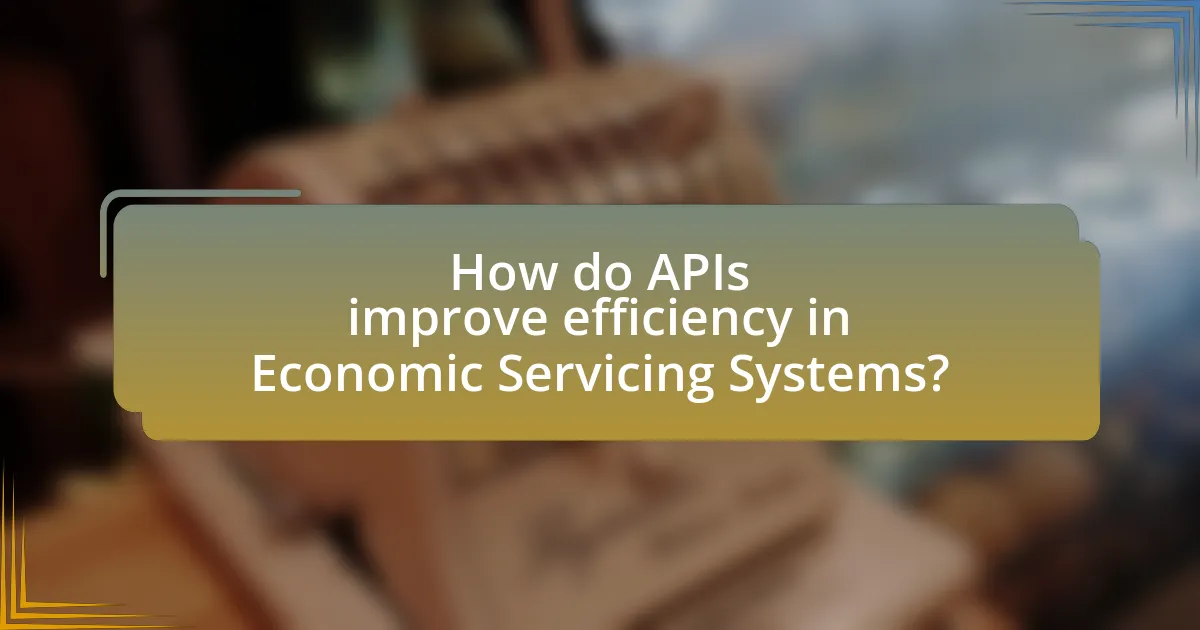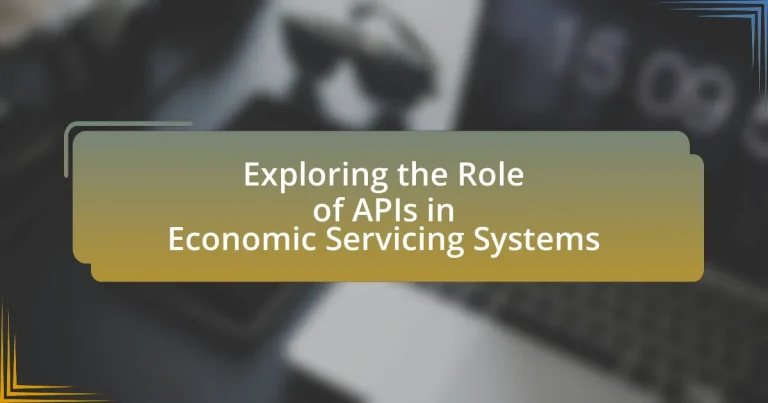APIs, or Application Programming Interfaces, are essential tools that facilitate communication and integration between various software applications within Economic Servicing Systems. This article explores the significance of APIs in enhancing operational efficiency, automating economic processes, and improving service delivery speed. It discusses the common protocols used in API implementation, the challenges faced such as security vulnerabilities and compatibility issues, and best practices for ensuring effective API usage. Additionally, the article highlights the impact of APIs on reducing operational costs and supporting scalability, ultimately demonstrating their critical role in modern economic servicing environments.

What are APIs and their significance in Economic Servicing Systems?
APIs, or Application Programming Interfaces, are sets of protocols that allow different software applications to communicate and interact with each other. In Economic Servicing Systems, APIs play a crucial role by enabling seamless integration between various financial services, platforms, and applications, thereby enhancing efficiency and user experience. For instance, APIs facilitate real-time data exchange, allowing businesses to access financial information, automate transactions, and improve service delivery. According to a report by McKinsey, companies that effectively utilize APIs can reduce operational costs by up to 30%, demonstrating their significant impact on economic servicing efficiency.
How do APIs facilitate communication in Economic Servicing Systems?
APIs facilitate communication in Economic Servicing Systems by enabling seamless data exchange between different software applications. They act as intermediaries that allow various systems, such as financial platforms and customer relationship management tools, to interact and share information in real-time. For instance, APIs can automate transactions, retrieve account information, and synchronize data across platforms, enhancing operational efficiency. The use of APIs in economic servicing is supported by the fact that over 80% of businesses report improved productivity through API integration, demonstrating their critical role in streamlining processes and enhancing user experiences.
What protocols are commonly used in APIs for these systems?
Commonly used protocols in APIs for economic servicing systems include HTTP/HTTPS, REST, SOAP, and GraphQL. HTTP/HTTPS serves as the foundational protocol for web communication, enabling data exchange between clients and servers. REST (Representational State Transfer) is widely adopted for its simplicity and scalability, allowing for stateless interactions and resource manipulation through standard HTTP methods. SOAP (Simple Object Access Protocol) is utilized for its robustness in enterprise environments, providing a protocol for exchanging structured information in web services. GraphQL offers a flexible alternative, allowing clients to request specific data structures, thus optimizing data retrieval. These protocols are integral to the functionality and interoperability of APIs within economic servicing systems.
How do APIs enhance data exchange between different economic services?
APIs enhance data exchange between different economic services by providing standardized protocols that facilitate seamless communication and data transfer. This standardization allows disparate systems to interact efficiently, reducing the complexity and time required for integration. For instance, APIs enable financial institutions to share transaction data in real-time, which improves the speed of services like payment processing and fraud detection. According to a report by McKinsey, companies that effectively utilize APIs can reduce operational costs by up to 30% while increasing service delivery speed, demonstrating the significant impact of APIs on economic service efficiency.
What challenges do APIs face in Economic Servicing Systems?
APIs in Economic Servicing Systems face several challenges, including security vulnerabilities, data privacy concerns, and integration complexities. Security vulnerabilities arise from the exposure of sensitive financial data, making APIs attractive targets for cyberattacks; for instance, a 2020 report indicated that 83% of organizations experienced API security breaches. Data privacy concerns are heightened due to regulations like GDPR, which require strict handling of personal data, complicating API design and implementation. Integration complexities stem from the need to connect diverse systems and technologies, often leading to increased development time and costs; a study by MuleSoft found that 90% of IT leaders reported integration as a significant challenge. These factors collectively hinder the effectiveness and reliability of APIs in economic servicing contexts.
What security concerns are associated with APIs in these systems?
APIs in economic servicing systems face several security concerns, primarily including data breaches, unauthorized access, and insufficient authentication mechanisms. Data breaches can occur when sensitive information transmitted through APIs is intercepted, leading to potential financial loss and reputational damage. Unauthorized access is a significant risk, as APIs may expose endpoints that can be exploited by malicious actors if proper access controls are not implemented. Insufficient authentication mechanisms, such as weak API keys or lack of token validation, can further exacerbate these vulnerabilities, allowing attackers to gain unauthorized access to critical system functionalities. According to a report by the API Security Project, 94% of organizations have experienced an API security incident, highlighting the prevalence of these concerns in real-world applications.
How do compatibility issues affect API integration in Economic Servicing Systems?
Compatibility issues significantly hinder API integration in Economic Servicing Systems by causing data exchange failures and operational inefficiencies. When APIs from different systems do not align in terms of data formats, protocols, or versioning, it leads to errors in communication, resulting in incomplete or inaccurate data transactions. For instance, a study by the International Journal of Information Management highlights that 70% of integration projects fail due to compatibility challenges, underscoring the critical need for standardized interfaces and protocols. This lack of compatibility can also increase development time and costs, as additional resources are required to bridge the gaps between disparate systems.

How do APIs improve efficiency in Economic Servicing Systems?
APIs improve efficiency in Economic Servicing Systems by enabling seamless data exchange and integration between different software applications. This integration reduces manual data entry, minimizes errors, and accelerates transaction processing times. For instance, a study by McKinsey & Company found that companies utilizing APIs can reduce operational costs by up to 30% due to streamlined workflows and enhanced automation. Furthermore, APIs facilitate real-time access to financial data, allowing for quicker decision-making and improved customer service, which are critical in economic servicing environments.
What role do APIs play in automating economic processes?
APIs facilitate the automation of economic processes by enabling seamless data exchange and integration between different software systems. This integration allows for real-time communication, reducing manual intervention and increasing efficiency in transactions, reporting, and analytics. For instance, a study by McKinsey & Company highlights that companies utilizing APIs can reduce operational costs by up to 30% through improved automation and streamlined workflows. By connecting disparate systems, APIs enhance the speed and accuracy of economic activities, ultimately driving productivity and innovation in various sectors.
How do APIs reduce operational costs in Economic Servicing Systems?
APIs reduce operational costs in Economic Servicing Systems by streamlining processes and enabling automation. By facilitating seamless data exchange between different software applications, APIs eliminate the need for manual data entry and reduce the likelihood of errors, which can be costly. For instance, a study by McKinsey found that companies leveraging APIs can reduce operational costs by up to 30% through improved efficiency and faster service delivery. Additionally, APIs allow for the integration of third-party services, which can further lower costs by providing access to specialized functionalities without the need for extensive in-house development.
What impact do APIs have on service delivery speed?
APIs significantly enhance service delivery speed by enabling seamless communication between different software systems. This integration allows for real-time data exchange, reducing the time required for processes such as order fulfillment and customer support. For instance, a study by MuleSoft found that organizations using APIs can achieve a 50% reduction in time-to-market for new services. This efficiency stems from the ability to automate workflows and access external services quickly, which streamlines operations and accelerates response times.
How do APIs support scalability in Economic Servicing Systems?
APIs support scalability in Economic Servicing Systems by enabling seamless integration and communication between various software components and services. This integration allows systems to efficiently handle increased loads and expand functionalities without requiring significant changes to the existing infrastructure. For instance, APIs facilitate the addition of new services or features, such as payment processing or customer relationship management, which can be scaled independently based on demand. Furthermore, according to a study by MuleSoft, 83% of IT leaders reported that APIs help them scale their operations more effectively, demonstrating their critical role in enhancing system performance and adaptability in economic servicing contexts.
What are the benefits of using APIs for expanding service offerings?
Using APIs for expanding service offerings enables businesses to enhance functionality, streamline integration, and foster innovation. APIs allow companies to connect with third-party services, which can lead to the rapid development of new features and services without the need for extensive internal resources. For instance, a study by McKinsey & Company highlights that organizations leveraging APIs can reduce time-to-market for new services by up to 30%. Additionally, APIs facilitate data sharing and interoperability, which can improve customer experiences and operational efficiency. This capability is evidenced by companies like Spotify, which integrates various APIs to enhance its music streaming service, thereby expanding its offerings and user engagement.
How do APIs enable integration with third-party services?
APIs enable integration with third-party services by providing standardized protocols and tools that allow different software applications to communicate and share data seamlessly. This interoperability is achieved through defined endpoints and data formats, such as JSON or XML, which facilitate the exchange of information between disparate systems. For instance, a payment processing API allows an e-commerce platform to connect with a payment gateway, enabling transactions without requiring the platform to develop its own payment processing system. This capability is evidenced by the widespread use of APIs in various industries, where companies leverage them to enhance functionality, streamline operations, and improve user experiences by integrating external services efficiently.

What are the best practices for implementing APIs in Economic Servicing Systems?
The best practices for implementing APIs in Economic Servicing Systems include ensuring robust security measures, maintaining clear documentation, and adopting version control. Robust security measures, such as OAuth 2.0 for authentication and HTTPS for data transmission, protect sensitive economic data from unauthorized access. Clear documentation facilitates easier integration and usage by developers, enhancing the overall efficiency of the system. Adopting version control allows for the management of changes and backward compatibility, ensuring that existing integrations remain functional as the API evolves. These practices are essential for creating reliable and scalable economic servicing systems that can adapt to changing requirements and maintain data integrity.
How can organizations ensure API security in Economic Servicing Systems?
Organizations can ensure API security in Economic Servicing Systems by implementing robust authentication and authorization mechanisms. These mechanisms, such as OAuth 2.0 and API keys, help verify user identities and control access to sensitive data. Additionally, organizations should employ encryption protocols like TLS to secure data in transit, preventing unauthorized interception. Regular security audits and vulnerability assessments are essential to identify and mitigate potential threats, as evidenced by the 2021 Verizon Data Breach Investigations Report, which highlighted that 36% of data breaches involved web applications, including APIs. By adopting these practices, organizations can significantly enhance the security of their APIs within Economic Servicing Systems.
What measures can be taken to protect sensitive data in API transactions?
To protect sensitive data in API transactions, implementing encryption is essential. Encryption secures data during transmission, ensuring that even if intercepted, the information remains unreadable. Additionally, using secure authentication methods, such as OAuth 2.0, helps verify the identity of users and applications accessing the API, reducing unauthorized access risks. Furthermore, employing rate limiting and monitoring can prevent abuse and detect anomalies in API usage, which is crucial for safeguarding sensitive information. According to the 2021 API Security Report by Salt Security, 94% of organizations experienced API security issues, highlighting the importance of these protective measures.
How can organizations monitor API performance effectively?
Organizations can monitor API performance effectively by implementing comprehensive monitoring tools that track key performance indicators (KPIs) such as response time, error rates, and throughput. These tools, such as New Relic, Datadog, or Prometheus, provide real-time analytics and alerts, enabling organizations to identify performance bottlenecks and issues promptly. For instance, a study by the API Management company, 3scale, indicates that organizations using monitoring solutions can reduce downtime by up to 50%, demonstrating the effectiveness of proactive performance management.
What common pitfalls should be avoided when using APIs in Economic Servicing Systems?
Common pitfalls to avoid when using APIs in Economic Servicing Systems include inadequate documentation, which can lead to misunderstandings about API functionality and usage. Poorly designed error handling can result in unhandled exceptions, causing system failures. Additionally, neglecting security measures, such as authentication and data encryption, exposes sensitive economic data to risks. Failing to monitor API performance can lead to unaddressed latency issues, affecting user experience. Lastly, not adhering to versioning practices can create compatibility problems when updates are made, disrupting service continuity. These pitfalls can significantly hinder the effectiveness and reliability of Economic Servicing Systems.
What are the risks of neglecting API documentation?
Neglecting API documentation poses significant risks, including increased development time, higher maintenance costs, and potential security vulnerabilities. Without clear documentation, developers may struggle to understand how to effectively use the API, leading to inefficient coding practices and longer onboarding times for new team members. This inefficiency can result in project delays and increased labor costs, as teams spend more time troubleshooting issues that could have been avoided with proper documentation. Furthermore, inadequate documentation can lead to misconfigurations or misuse of the API, which may expose the system to security risks, such as unauthorized access or data breaches. According to a survey by the API Management company, 70% of developers reported that poor documentation was a major barrier to effective API usage, highlighting the critical importance of maintaining comprehensive and accessible API documentation.
How can poor API design lead to integration issues?
Poor API design can lead to integration issues by creating inconsistencies in data formats, unclear documentation, and lack of versioning. These factors complicate the process of connecting different systems, as developers may struggle to understand how to properly interact with the API. For instance, if an API returns data in an unexpected format, it can cause errors in applications that rely on that data, leading to failed integrations. Additionally, inadequate documentation can result in misunderstandings about how to use the API effectively, further exacerbating integration challenges. A study by the API Academy found that 70% of integration failures stem from poor API design and documentation, highlighting the critical importance of well-structured APIs in ensuring seamless system interactions.
What practical steps can organizations take to optimize their API usage in Economic Servicing Systems?
Organizations can optimize their API usage in Economic Servicing Systems by implementing several practical steps. First, they should conduct a thorough API inventory to identify all existing APIs and assess their usage, performance, and relevance. This allows organizations to eliminate redundant or underperforming APIs, streamlining their API ecosystem.
Next, organizations should establish clear API governance policies that define standards for API design, documentation, and versioning. This ensures consistency and facilitates easier integration across various systems. Additionally, adopting API management tools can enhance monitoring, security, and analytics, providing insights into API performance and usage patterns.
Furthermore, organizations should prioritize the development of APIs that are user-centric, focusing on the needs of developers and end-users. This can be achieved by gathering feedback and iterating on API design based on real-world usage.
Lastly, organizations can leverage caching strategies and optimize data payloads to improve API response times and reduce server load, enhancing overall system efficiency. These steps collectively contribute to a more effective and efficient API usage within Economic Servicing Systems.


